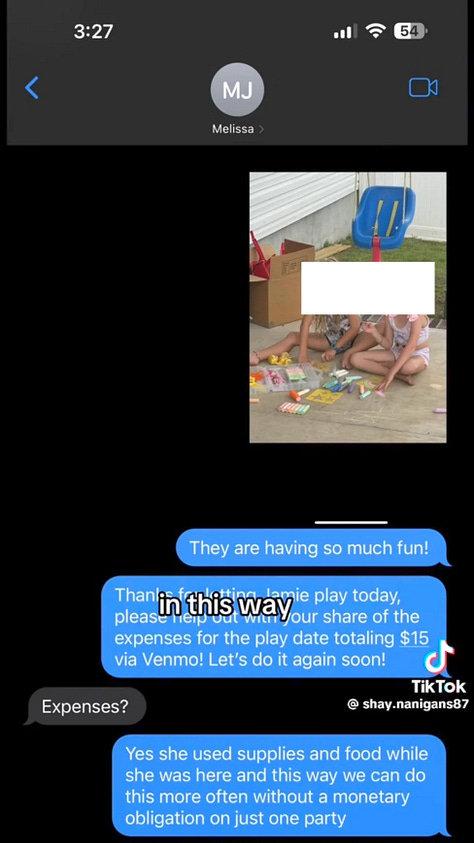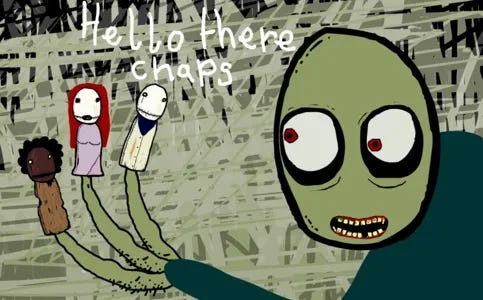brave enough is a newsletter about finding balance between technology, nature and modern life. Join the club ❤️🔥
There’s something about the internet that has bothered me for a while, but I’ve been unable to articulate exactly what it is until now.
I remember logging on to the internet in “the computer room” as a young teenager and being dazzled by the content I could find. I was surfin’ the world wide web 🏄♀️ which was awash with hilarious YouTube videos, personal blogs and informative articles.
Now, the whole thing feels like a once-beautiful beach strewn with garbage. The existence of algorithms has allowed new forms of content to emerge — something I now refer to as digital litter.
And it’s junk food for our minds 🗑️
The way in which we measure the quality of and thereby monetise online content is severely flawed. Most platforms follow the same rudimentary logic that values “engagement” over everything else. A view is a view, a click is a click, a share is a share, a like is a like. Lots of engagement = good. Lots of followers = also good. All of this means something because we decided it a while ago. It’s kind of like the 40-hour workweek — there’s a sense of “well it’s always been this way”, so let’s just continue our digital lives under this pretence and never revisit it. As Patrick from Hard Refresh perfectly summarised: “The world’s worst-kept secret is that the One Business Model to Rule Them All is based on capturing and keeping our attention online. In fact, nearly ALL of the business models in an attention economy are predicated on grabbing eyeballs, whether it’s for social media, video, news, music, search, discussion forums, podcasts, or any other information channel under the sun.”
Most problematically, websites and social media platforms have no way to distinguish between what is good and bad engagement.
My beef with this is that under these conditions, the content available on our internet has degraded significantly over the years, with the last few years being the most acute. Our internet has now become a wasteland of content that was created for one purpose only: garner as much “engagement” as possible in order to suck every last dollar out of the system.
Enter rage bait, a form of content specifically designed to maximise clicks, shares, and interactions by enraging or confusing the viewer, all at the expense of meaningful discourse. Rage bait looks and feels similar to tabloid newspapers but it’s even more empty, because even a tabloid has to tack some kind of article below the dodgy headline.
Some rage bait is obvious — videos where people eat or apply make-up in ridiculous or messy ways, recipe videos that claim you can make mashed potatoes by boiling Pringles. However, other forms are more underhand. For example, the mother who demanded $15 payment for art supplies and food she bought for her daughter’s playdate with a friend — and then posted about it on TikTok. OBVIOUSLY it is completely ridiculous to ask another parent for the cost of the apple slices their child ate at your house. This creator knows that, and she also knows that hundreds if not thousands of people will jump into the comments to give her a piece of their mind. And although her credibility goes down, her “engagement” goes up 💸



I now know how to spot this kind of content from a mile away and avoid it like the plague. The problem is there are so many other versions of it, mutating rapidly across our online spaces. One that keeps catching me lately are videos that stop just before the moment you were waiting for (e.g. a kitchen renovation video, yet the final shot of the kitchen is missing from the end). Argh! Hating yourself already, you click onto the creator’s channel and scroll through their content to try and find what you invested your time into. You don’t find it, but you find something else… and before you know it, you’ve been sucked in.
All of the examples above are relatively harmless if you disregard them costing people both money and time, but what really boils my blood is when digital litter is fed to children.
Thanks to the iPad, YouTube now dominates the world of free children’s entertainment. Because children tend to watch content they like repetitively, there are thousands of channels that pump out nonsensical, AI generated children’s content all day long in return for ad revenue. Tutorial channels for adults explain how to create children’s content “in minutes” and start raking in the cash. These kinds of videos easily collect tens of millions of views.

The result? Children are now spending hours each day watching low quality, nonsensical animations that were created for “engagement”, not to educate. Often the content they are watching is not even marked as AI generated, which is against YouTube’s policies. This is in stark contrast to actual children’s television, where the concepts are commonly developed by experts and workshopped with children before being recorded. I am baffled that I don’t see more outrage about this. The people who make this kind of content literally do not care about children’s education and development.
The quest for engagement is causing human harm. By now, I think everyone is aware of how mukbangs became one of the most unhinged forms of rage bait. This once-innocent concept of eating on a live stream — which started in South Korea as a form of digital companionship aimed at young people eating dinner alone in their apartment — escalated once the medium became popular. Mukbang content creators started posting more and more extreme content: eating enormous quantities of food, competitive eating time trials or eating in really repulsive ways. Some creators post multiple mukbangs per day. Of course, their health deteriorates rapidly as they do this. They destroy their own bodies to feed the machine, a car crash in slow motion that millions of people tune in to watch.
Organisation and cleaning videos, once a calming salve in the chaos of modern life, have also fallen victim to engagement bait. What started as people power-hosing driveways or adding shelves to their bedroom wall transformed into ridiculous “restock” videos that are basically dystopian levels of overconsumption masked as organisation. Think dozens of plastic trays, each little pocket filled with single-use, individually wrapped wet wipes, teeny-tiny lotions and mini deodorants. Most of the accessories promoted in these videos are cheap, plastic, chemical-filled trash from Amazon that will end up in a landfill. I also have a hard time believing that anyone who posts this kind of content is actually using these items. The Stanley Cup snack tray is the most insane thing I have ever seen — WHO in their right mind wants the scent of a hot burger right under their nose as they take a sip of their drink? 🤢



“Back in my day…”
This is my full circle moment where I morph into my parents, shake my head and grumble: “Back in my day, the internet wasn’t like this.”
BUT IT’S TRUE!
I feel protective over the internet because it is a place where I (at least partially) grew up. It has the power to share important information faster than ever before and be a positive, creative and mind-opening space. We spend a lot of our time here — and if we are products of our environment, then I worry about the impact of an internet that promotes drama, nonsense and vitriol above all else on society at large.
This isn’t to say that all content we see online should be vanilla or high brow. As a millennial who grew up watching Salad Fingers, I cherish surreal memes and absurd comedy. What’s more, I revisit old YouTube videos, vines (there’s a blast from the past), articles and remixes because good content is evergreen, even if it is slightly dated or pixelated. I don’t think any of the digital litter we are seeing nowadays is something people are going to want to go back to, ever.
But of course, if there is money to be made in our system of “engagement”, then people are going to follow the money. In today’s economy, it’s hard to blame anyone for that. The tragic part is that we seem increasingly willing to trade integrity, reputation or the chance to build meaningful audiences in exchange for easy money.
However, I just don’t buy that taking part in this won’t damage your soul in some way. Putting out enraging or degrading content has to have some kind of karmic impact down the line. I know this isn’t exactly a hot take, but I really think that making people more angry at one another is literally the last thing we need right now. I want to restore my faith in humanity, not torpedo it.
Mission clean up the internet
It seems like algorithms won’t get a makeover anytime soon, so becoming more aware of what we consume is the only way to fight back. In real life we vote with our money, but online we vote with our attention. If we all decide that we don’t want this kind of content on the internet anymore, the money will follow. The market decides. En masse, this could have a huge impact.
Here’s some action you can take if you, like me, are tired of seeing digital litter flood our online spaces:
Learn to recognise and avoid digital litter: Tune in to how the content you watch is making you feel. Block accounts that post engagement bait and, if possible, tell the platform that you don’t want to see it. Use the algorithm to your advantage to ensure that it feeds you content that will lift you up, not drag you down.
Understand how the platforms you use measure engagement and recommend content: Most people know that platforms will track things like views, likes, shares and comments to build a picture of what we are interested in. However, there are other ways that platforms track what you’re doing that you may be less aware of: they can track if you pause while scrolling, how long you hover over a post, the number of times you revisit a post, even whether you zoom in to an image. It’s not as simple as not liking or not following digital litter creators — you need to disengage completely.
Get off TikTok: Delete your account, now! I know this is biased because I am very against this platform, but from what I observe it seems to be a giant petri dish of digital litter that offers very few options to curate what you see.
Vet what your children are watching: If you have children or are caring for children, closely monitor the content they are consuming on a regular basis to ensure that it is nourishing and educational.
Don’t contribute to it: Make content with integrity - be it informative, entertaining, funny or creative. Not only will you build a more sustainable and meaningful audience, but it will be way more fulfilling, too. And if you know someone who is making digital litter, reach out to them for a compassionate discussion about the potential harm their content is causing.
Spend your anger more wisely: There is enough room for our anger online and we have a lot to be angry about right now. Redirect it at actual injustices — not someone eating two burritos in four minutes for views.
I’m curious to hear your thoughts on this topic in the comments!
As always, thanks for reading 💛
I leave you with this rather brilliant quote:
“Some poor, phoneless fool is probably sitting next to a waterfall somewhere totally unaware of how angry and scared he’s supposed to be.”
― Duncan Trussell









This may be the single most effect text I have read to motivate me to stop doomscrolling. You articulated perfectly how I feel after I’ve gone one of those addictive black holes of freed-refreshings. I particularly felt a pang of relatability when you describe how much you care about the internet. It’s an important place for me too, and I feel truly sad about how much it has cluttered up. Like my favourite park has been left full of trash after an illegal raver, or something. Thank you so much for sharing!
Wow! Thank you for writing this. This perfectly captures everything I hate about the internet now. I actually just logged out of all of my social accounts a week ago as a way to take a breather from doomscrolling after the election, but a secondary benefit is not seeing any of this nonsense. It really does make life better. I fear just opting out as individuals, however, won't bring back the internet of the "old days."